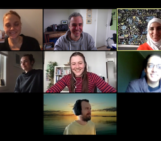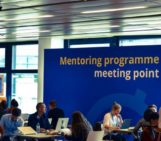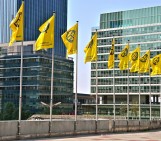
This year, EGU’s science-policy related sessions will be run a little bit differently! In case you haven’t already heard, EGU will be hosting EGU2020: Sharing Geoscience Online (#shareEGU20) from 4-8 May 2020 in place of the physical General Assembly. While this fully online event is in response to the COVID-19 crisis, it is also an opportunity to experiment with online networking and science communication. Furthermore #shareEGU20 will be completely open access allowing anyone to participate!
As you glace at the programme, you’ll notice that there’s not only a diverse array of sessions that you can attend within your own area of expertise but there are also hundreds of sessions outside of your research field, as well as sessions on topics that can be applied to a wide range of scientific divisions, jobs and industries – such as science for policy!
Science for policy spans the different session types including: Short Courses (which will be available as pre-recorded webinars), scientific and interdisciplinary sessions (shared using “displays”), and Union Symposia and Great Debates (which will be live-streamed). Even if you’re just a bit curious about science for policy, it’s definitely worth adding a couple of the policy-related sessions into your #shareEGU20 personal programme! This blog highlights some of the sessions that you might like to consider.
Communicating A Global Climate Crisis: If our house is on fire, why haven’t we called the fire brigade…? (Fri, May 8, 2020, 10:45) REGISTER NOW: This Symposium aims to highlight the challenges that exist in communicating climate science and demonstrate ways in which scientific research and evidence can be communicated in a way that is meaningful and persuasive to both the public and policymakers.
Geosciences and UN Sustainable Development Goals: pathways for the future (Thurs, May 7, 2020, 10:45) REGISTER NOW: The Sustainable Development Goals (SDGs) are a call to action to protect the planet, end poverty and ensure peace. This session will highlight the role of Geosciences in supporting the SDG’s 2030 Agenda and beyond.
Values versus facts: should geoscience get personal? (Thurs, May 7, 2020, 16:15) REGISTER NOW: This Great Debate will discuss how scientists can communicate their research with people who reject traditional science narratives, the role of emotions and values in science communication and what makes people believe fake news.
Short Courses
What is science for policy and how can you get involved? (Fri, 08 May 2020, 12:30): Watch this short course and join in the discussion on YouTube to learn about how you can get involved with science for policy initiatives including specific opportunities on a local, national and international scale!
Scientific Sessions
The Science-policy interface in hydrology – essentials for more impactful science (Wed, 06 May, 10:45–12:30): This session will address the necessary skills to facilitate the uptake of science in policy formulation and implementation. It will also highlight what the key gaps in connecting science to feasible policy solutions in the water sector are.
Natural Hazards Education, Communications and Science-Policy-Practice Interface (Wed, 06 May, 16:15–18:00). This session outlines how knowledge exchange between researchers, the public, policymakers, and practitioners who are working on and are impacted by natural hazards can be improved.
Water resources policy and management – managing trade-offs at the nexus between water, food and energy (Tue, 05 May, 14:00–15:45): Among other things, this session will evaluate integrated technical, policy, and/or governance nexus solutions to address critical water-food-energy-environment system challenges.
Geoethics: how and why should geosciences serve society? (Thu, 07 May, 08:30–10:15): All branches of geosciences have ethical, social and cultural implications. Topics that geoethics deal with are broad and include recognising the importance of effective regulation and policymaking.
Please keep in mind that this isn’t an exhaustive list! There will be lots of other sessions throughout #shareEGU20 that can either be directly linked with science for policy or that include research relevant for policymakers. You can find more policy-related sessions in the Programme. This page also tags sessions under the categories of policy, diversity, media, early career scientists and public engagement so that if you have an interest in these topics you can find relevant sessions quickly.
If you have any further questions or comments about Sharing Geoscience Online and how you can get involved, feel free to get in touch via policy@egu.eu. Looking forward to meeting you there virtually next week!
Due to the ongoing coronavirus outbreak, EGU has made the decision to cancel this year’s physical General Assembly in Vienna and instead offer a partial alternative meeting online, called #shareEGU20. Over the next few weeks in the run up to #shareEGU20, which will be held from the 4 – 8 May 2020, we will be posting regular updates and information about how to get involved, what EGU can offer during this week and how to find each other. We know that there will be many, many questions that people have, and we are learning how to do this right along with you, so please send us your questions over social media or by emailing egu2020@copernicus.org or info@egu.eu. We’re looking forward to sharing EGU with you, online!




